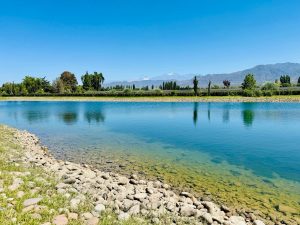Traveling to Argentina during Covid-19: What you need to know before you go
Foreigners will be allowed to enter the country starting Nov. 1 without quarantining, as long as they comply with protocols. Facemasks are no longer required for individuals who are alone in open-air settings, and social gatherings have no restrictions.
Authorities in Argentina have significantly relaxed COVID-19-related restrictions nationwide in response to an important decrease in cases during recent months. The Argentine government has announced that it will reopen Argentina’s borders to all fully vaccinated foreign travelers effective Nov. 1, 2021. Until that time, most nonresident foreign nationals, other than fully vaccinated travelers from Bolivia, Brazil, Chile, Paraguay, and Uruguay, remain prohibited from entry. Only citizens and legal residents of Argentina, as well as select foreign nationals, are allowed to enter Argentina, with only limited exceptions.



Country-Specific Information
All airline passengers to the United States ages two years and older must provide a negative COVID-19 viral test taken within three calendar days of travel. Alternatively, travelers to the U.S. may provide documentation from a licensed health care provider of having recovered from COVID-19 in the 90 days preceding travel. Check the CDC website for additional information and Frequently Asked Questions.
COVID-19 Testing:
• Both PCR and antigen tests are widely available in the City of Buenos Aires. Outside of the City of Buenos Aires, U.S. citizens may find varying availability of testing.
• U.S. citizens may obtain COVID-19 tests at many private labs (diagnósticos/laboratorios). U.S. citizens should be prepared to pay the cost of the test and then work with insurance companies to seek reimbursement if applicable. The following is a non-exhaustive list of labs providing testing in the Buenos Aires area:
• If so, are test results reliably available within 72 hours? Yes.
• Within the City of Buenos Aires, if using a private lab, results are generally available within 24 hours. If using a public hospital, the time frame for receiving results can vary between eight and 72 hours. Please note that private and public facilities may experience delays in returning test results if demand for tests increases.
• For information on limited humanitarian exemptions to CDC’s requirement that all U.S. bound travelers present a negative COVID test, please review the following page. Humanitarian exemptions to this order will be granted on an extremely limited basis and will only be considered when the country of departure lacks adequate COVID-19 testing capacity. To submit information in support of an exemption, email BuenosAiresCDCwaiver@state.gov.
• Test results are generally provided electronically. Test results are provided in Spanish.
• Current proof of a COVID-19 vaccine does not satisfy the testing requirement for all passengers arriving to the United States.
Entry and Exit Requirements:
• Foreign citizens, with direct relatives (spouse, parents, minor children, and adult children) who are Argentine citizens or residents, may enter Argentina for a temporary visit under exceptional circumstances if certain conditions are met. U.S. citizens should be advised that whether entry will be authorized is a discretionary decision made by Argentine immigration officials at specific ports of entry; the U.S. Embassy cannot intercede in this process. If the requested entry is denied, the passenger will be ordered to depart on the next available flight or means of transport. In addition, travelers seeking entry under this program must present: a birth certificate, marriage certificate, or legal documentation of common law marriage or partnership (with required apostille) as evidence of the direct relation with the Argentine citizen. Travelers are also required to present a copy of the National ID Card (DNI) of the Argentine relative, return travel reservation/tickets, negative COVID-19 PCR test taken within 72 hours before travel, and evidence of medical travel insurance that includes hospitalization and quarantine coverage for COVID-19. The traveler must also present at the port of entry a letter of request that provides the necessary reason for the visit, dates of entry and departure to and from Argentina, address where the traveler will stay, and any additional relevant information required for the immigration official to evaluate the request. The Government of Argentina announcement of this program is available at the following link.
• Test results are generally provided electronically. Test results are provided in Spanish.
• Current proof of a COVID-19 vaccine does not satisfy the testing requirement for all passengers arriving to the United States.
• International travelers to Argentina are restricted to the following ports of entry: Ministro Pistarini Ezeiza International Airport, San Fernando International Airport, Aeropuerto Internacional Gobernador Francisco Gabrielli “El Plumerillo”, Tte. Benjamín Matienzo International Airport, Buquebus Ferry Terminal; and the land border crossings of Paso de los Libres – Uruguayana, Sistema Cristo Redentor, San Sebastián, and Gualeguaychú – Fray Bentos.
• Foreign citizens traveling under this program are required to pay a fee to Argentine Immigration Office upon arrival.
• U.S. citizens residing in Argentina who enter the country will be exempted from quarantine so long as they have been fully vaccinated and the second dose has been given 14 days before arrival in Argentina. Argentine Authorities will require evidence of vaccination. See the Government Order here.
• A negative COVID-19 PCR test administered no more than 72 hours prior to departure is required for all arriving international travelers. Upon arrival all passengers will be required to undergo a COVID-19 PCR test administered by local health officials. All passengers are required to undergo a COVID-19 PCR test between the fifth and seventh day after arrival. All passengers must bear the costs of the COVID-19 test. Travelers may carry out social activities but they are prohibited from attending mass events or using collective land transport.
• All unvaccinated travelers, including minor children, are required to quarantine for seven days upon arrival.
• Is a negative COVID-19 test (PCR and/or serology) required for entry? Yes.
• A negative COVID-19 PCR test administered no more than 72 hours prior to departure is required for all arriving international travelers.
• Are health screening procedures in place at airports and other ports of entry? Yes.
• All passengers arriving in Argentina will be required to undergo a COVID-19 PCR test administered by local health officials. All passengers must bear the cost of the COVID-19 test.
• U.S. citizens who are legal residents in bordering countries are currently allowed to enter Argentina if they have been in the bordering country 14 days before arrival in Argentina and will be exempted from quarantine so long as they have been fully vaccinated and the second dose has been given 14 days before arrival in Argentina. Argentine Authorities will require evidence of vaccination. See the Government Order here.
• The full text of the announcement can be found here (in Spanish).
• Permission must be granted by Argentine immigration authorities and travelers should be prepared to show any relevant documentation related to their employment and purpose of travel.
• The U.S. Embassy has no role in this exemption request and all inquiries should be directed to Argentine immigration authorities here.
• U.S. citizens will be allowed to enter Argentina as from November 1, 2021 and will be excepted from quarantine so long as they have been fully vaccinated and the second dose has been given 14 days before arrival in Argentina. Argentine Authorities will require evidence of vaccination. See the Government Order here.
• Argentine immigration authorities require that all travelers entering or exiting Argentina submit an electronic sworn statement within the 48 hours before their arrival/departure. The form is available here. Travelers may be required to present the confirmation e-mail they receive from this system to board a flight.
• All passengers transiting Argentina must comply with the same requirements as those passengers entering and remaining in Argentina.
• Multiple countries in the region have implemented travel restrictions with little advance notice. To stay informed of the latest travel restrictions, visit the U.S. Embassy COVID-19 webpage for the country of your intended destination or stopover.
• As of July 8, 2021, Argentine Immigration authorities (Migraciones Argentinas) announced the termination of the automatic 30-day visa extension for all non-residents with visas originally set to expire after March 17, 2020. See details on the most recent decree here and contact Migraciones with any questions.
Movement Restrictions:
• Is a curfew in place? No.
• While there is no nationwide curfew, cities and departments on high alert given the epidemiological and sanitary situation may be subject to curfew. Additional information regarding the epidemiological and sanitary levels within Argentina can be found here (in Spanish).
• Anyone residing or traveling in Argentina should consult with local authorities for the most up to date information regarding the status of each city or department as they may move between mandatory quarantine and social distancing measures depending on the current conditions. For more information, visit this page (in Spanish).
• Plan to limit your movements in accordance with the latest guidelines in your city.
• Masks or other face coverings are mandatory nationwide in public spaces, including public transportation and passenger vehicles.
• Are there restrictions on intercity or interstate travel? No.
• Additional information about interprovincial travel can be found here (In Spanish). Individual provinces may require additional local permits to enter or transit.
Quarantine Information:
• A negative COVID-19 PCR test administered no more than 72 hours prior to departure is required for all arriving international travelers. Upon arrival all passengers will be required to undergo a COVID-19 PCR test administered by local health officials. All passengers are required to undergo a COVID-19 PCR test between the fifth and seventh day after arrival. All passengers must bear the costs of the COVID-19 test. Travelers may carry out social activities but they are prohibited from attending mass events or using collective land transport.
• All unvaccinated travelers, including minor children, are required to quarantine for seven days upon arrival.
• Passengers who test positive for COVID-19 upon arrival or are determined to have been in close contact with a COVID-positive traveler will face a mandatory quarantine in a government determined location. Passengers must bear the cost of the mandatory quarantine. Passengers who test positive for COVID-19 upon arrival must also undergo and bear the cost of a COVID-19 genomic sequencing test.
• Provincial authorities and the City of Buenos Aires authorities may require any arriving passengers to quarantine in government mandated locations even if passenger have tested negative for COVID-19. Passengers must comply and bear the cost if ordered to quarantine.
• Passengers must undergo an additional COVID-19 PCR test on day seven of their quarantine as a condition for ending their quarantine period.
• In addition, provincial authorities may introduce additional quarantine measures and travel restrictions with little prior notice. Please check the website of your province’s Ministry of Health for more details.
Transportation Options:
• Are commercial flights operating? Yes.
• Several commercial carriers, including American, United, Delta, and Aerolíneas Argentinas, offer direct flights to the United States. Passengers electing to book a flight with a stopover in another country should verify with their air carrier and that country’s immigration authorities their ability to transit at their stopover point. For booking questions and documentary requirements, contact your air carrier.
• Individual provinces may require additional documentation. Each province has varying health, testing, and documentation requirements for entry, transit, and departure. You must check with the authorities of each province you intend to travel from, to, or through what requirements may apply to you. The national government is maintaining a list of entry requirements for various provinces here.
• Is public transportation operating? Yes.
Fines for Non-Compliance (if applicable):
• Failure to adhere to quarantine, social distancing, movement restrictions, and other health guidance may result in fines and/or criminal penalties, up to and including arrest and jail time.
Before you buy a travel insurance policy, check your government travel warnings and health advice – there may be no travel insurance cover for locations with a government travel ban or health advice against travel.
Contact us to start planning your own dream trip today!






No comment yet, add your voice below!